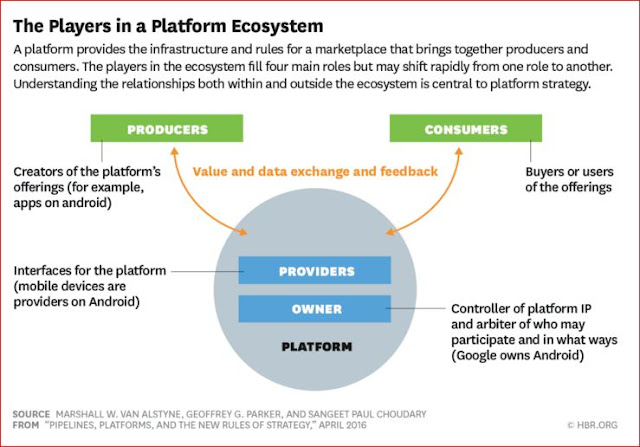Platforms always win
The blogger in me is always alert. Usually I don't feel it is there, sleeping like my dog at my side, while I work.
Browsing through Harvard Business Review, April 2016, I discovered a series of articles about pipeline versus platform products. The first one Pipelines, Platforms, and the New Rules of Strategy starts like this:
Large corporations even today hire consultants behemoths to advise on strategies for survival and growth, all coming from ivy-league schools like Harvard. They know nothing incumbent, still invisible strategies, not yet ready, that may be included in the their clients business planning and execution.
Where were those consultants when Steve Jobs decided the platform strategy for iPhone? Steve Jobs all he studied and never graduated, was calligraphy. He created the strategy for platforms and proved it works, as we read in this 1st paragraph, decimated the competitors market share. It was all intuitive, contrarian, apparently impossible to achieve.
The moral of the story is that large companies must tolerate and protect crazy, off-beat ideas of their own people, which one day may become the norm. Discipline does nor mean leveling everyone to a single corporate dogma.
Browsing through Harvard Business Review, April 2016, I discovered a series of articles about pipeline versus platform products. The first one Pipelines, Platforms, and the New Rules of Strategy starts like this:
We all knew that. But these two short paragraphs, made my Blogger instinct beep. How was this possible? BecauseBack in 2007 the five major mobile-phone manufacturers—Nokia, Samsung, Motorola, Sony Ericsson, and LG—collectively controlled 90% of the industry’s global profits. That year, Apple’s iPhone burst onto the scene and began gobbling up market share.By 2015 the iPhone singlehandedly generated 92% of global profits, while all but one of the former incumbents made no profit at all.
Nokia and the others had classic strategic advantages that should have protected them: strong product differentiation, trusted brands, leading operating systems, excellent logistics, protective regulation, huge RandD budgets, and massive scale. For the most part, those firms looked stable, profitable, and well entrenched.
iPhone had an innovative design and novel capabilities. But in 2007, Apple was a weak, nonthreatening player surrounded by 800-pound gorillas. It had less than 4% of market share in desktop operating systems and none at all in mobile phones
Apple (along with Google’s competing Android system) overran the incumbents by exploiting the power of platforms and leveraging the new rules of strategy they give rise to. Platform businesses bring together producers and consumers in high-value exchanges. Their chief assets are information and interactions, which together are also the source of the value they create and their competitive advantage.The authors state:
When a platform enters the market of a pure pipeline business, the platform virtually always wins
Nokia fall
Ziyad Jawabra, ex CEO of Nokia writes in a a LinkedIn postDuring the press conference to announce NOKIA being acquired by Microsoft, Nokia CEO ended his speech saying this “we didn’t do anything wrong, but somehow, we lost”. Upon saying that, all his management team, himself included, teared sadly.
They missed out on learning, they missed out on changing, and thus they lost the opportunity at hand to make it big. Not only did they miss the opportunity to earn big money, they lost their chance of survival.
The moral of the story
Why Nokia management did not see the change from product to platforms?Because at that time , there was no clever article in HBR to document this strategy.Large corporations even today hire consultants behemoths to advise on strategies for survival and growth, all coming from ivy-league schools like Harvard. They know nothing incumbent, still invisible strategies, not yet ready, that may be included in the their clients business planning and execution.
Where were those consultants when Steve Jobs decided the platform strategy for iPhone? Steve Jobs all he studied and never graduated, was calligraphy. He created the strategy for platforms and proved it works, as we read in this 1st paragraph, decimated the competitors market share. It was all intuitive, contrarian, apparently impossible to achieve.
The moral of the story is that large companies must tolerate and protect crazy, off-beat ideas of their own people, which one day may become the norm. Discipline does nor mean leveling everyone to a single corporate dogma.
 |
| See http://my-inner-voice.blogspot.com/2015/12/does-digital-age-require-digital.html |



Comments